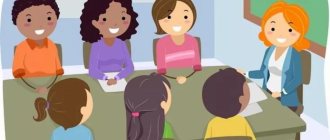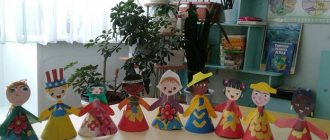Parents' meeting "Age-related characteristics of the mental development of children 4–5 years old."
Parents' meeting "Age-related characteristics of the mental development of children 4–5 years old."
Good evening, dear parents!
Today we will talk about the psychological characteristics of children 4-5 years old and what is important to develop in children of this age and what should be paid special attention to in their upbringing.
The age of 4-5 years is a period of relative calm, which passes without sudden jumps or crises. At the same time, the rate of child development does not decrease. Qualitative changes are taking place in all areas of his life.
To promote the personal development of a 4-5 year old child, the following must be taken into account.
Firstly, at this age the foundations of a creative attitude towards the objective world are already laid. For this purpose, you can use those modest crafts that a child creates with his own hands for play or as a gift to someone. If an adult systematically emphasizes that the child has done something himself, that he already knows a lot and can create an atmosphere of well-deserved recognition and success for everyone, then the satisfaction that the child will experience will encourage him to continue setting similar tasks.
Secondly, during this period, a truly cognitive attitude towards the world, a disinterested need for knowledge out of interest and desire to know, can arise. For the further development of cognitive interest, it is important not only to give the child new knowledge in a fun way, it is necessary to treat his own mental searches and their results with the utmost respect. At the fifth year of life, the child is already able to think without relying on direct experience. He acquires a circle of purely verbal knowledge. Operating with such knowledge, a child can sometimes come to the wrong conclusions and obtain logically imperfect results. Any sign of disrespect for these first independent intellectual steps can discourage a child from becoming interested in the field of knowledge and depriving him of self-confidence. Therefore, the most important requirement for the personal relationships of adults with children and in their relationships with each other is a serious and respectful attitude towards all, even incorrect, considerations of the child.
This does not mean that adults should approve of any wrong thoughts and considerations of children. Adults should not evaluate children, but discuss their considerations with them and object to them as if on equal terms, and not from above. It naturally follows that what is new in a child’s attitude towards other people should be, on the one hand, interest and respect for an adult as a source of new knowledge and a tactful assistant in his own intellectual quests, and on the other hand, a respectful and interested attitude towards similar intellectual quests his peers.
Physical development
During this age period, the following physical abilities of children are improved:
- increases endurance;
— coordination improves;
- movements become more accurate and confident;
— speed and agility indicators improve.
At the same time, children of middle preschool age are very active, they have a constant need for movement. If this need is not met and active motor activity is limited, children quickly become overexcited, become disobedient, and capricious.
Tip #1
Provide your child with opportunities for active mobility. Do not allow him to become overtired (pale appearance, shortness of breath, loss of coordination). Change your load and type of activity in a timely manner. Do not allow strength exercises.
Mental development
At the age of 4-5 years, many mental processes in a child become more voluntary and conscious (this means that the child can already set a goal, for example, to memorize a poem).
The thinking of the average preschooler moves to a new level - it becomes figurative, the child can already solve problems not only in the process of practical actions with objects, but also in his mind, relying on his figurative ideas about objects. Children can find similarities and differences between objects according to various criteria, group them according to essential characteristics, eliminate unnecessary things, and generalize.
Tip #2
Offer your child geometric figures, puzzles, mosaics, Lego and other manufacturers to play with.
In middle preschool age, memory capacity increases. Children can remember about 5-7 names of objects. Random memorization appears (they can learn small poems by heart). In the process of mastering speech and listening to literary works, children develop figurative and verbal memory.
Tip #3
Read fairy tales to children. Ask them to retell what they heard.
By the age of 5, attention becomes more and more stable (the child can engage in interesting activities for 15-20 minutes) - if the child goes after the ball, he will no longer be distracted by other interesting objects. An important indicator of the development of attention is that by the age of 5, action according to the rule appears in the child’s activities. It is at this age that children begin to actively play games with rules: board games (lotto, children's dominoes) and mobile games (hide and seek, tag).
Tip #4
Draw children's attention to a detailed study of various objects, finding similarities and differences.
Imagination is actively developing. The child fantasizes a lot, invents imaginary friends, and creates a fairy-tale world around himself. He dreams of his own superpowers and great recognition of his merits. Thanks to a developed imagination, a child can understand something that he himself has not seen, but which he will be told about in detail and clearly. Due to his violent imagination, he may develop fears.
Tip #5
Don't ignore children's fears. Discuss with your child what scares him. Look for information on how you can get rid of fears and, if necessary, contact specialists.
In the fourth or fifth year of life, the child not only actively masters speech, he creatively masters the language, he, in essence, engages in word creation (K. Chukovsky).
At this stage, sound pronunciation improves, children master the grammatical structure of the language: they understand and correctly use prepositions, learn to construct complex sentences, etc. Coherent speech develops (the child becomes able to retell a short literary text, compose a story based on a picture or a series of pictures).
Tip #6
If your child still has problems with sound pronunciation, do not ignore this problem - contact a speech therapist.
A game
The game is becoming more and more complex: it is already plot-role-playing (plot, roles, game actions). As the game progresses, the child can change the role, and it becomes possible to establish role interactions (role dialogue). In the game, the child reflects the objective actions of adults aimed at other people, designating these actions with a role (I am a doctor, I am a mother, I am a salesperson).
At this age, children develop ideas about how girls should behave and how boys should behave (“I’m a boy, I wear pants, not dresses, I have short hair,” about the gender of people of different ages (a boy is a son, grandson, brother, father, man; girl - daughter, granddaughter, sister, mother, woman).By the age of 5, children have an understanding of the characteristics of the most common male and female professions, types of recreation, specific behavior in communicating with other people, about individual feminine and masculine qualities, are able to recognize and evaluate the emotional states and actions of adults of different sexes.
Communication with adults and peers
The child regards his parents as an inexhaustible and authoritative source of new information, and therefore asks them many different questions: “Why?”, “Why?”, “For what?”. Therefore, the age of 4-5 years is called “the age of why”.
What questions may children ask:
- Why does the sun shine?
-Where does the Earth end?
- Why does the wind blow?
— Why do you need to go to kindergarten?
Tip #7
Do not brush off the child’s questions; support the child at this stage. Even if you find it difficult to answer a question, consult various sources. By doing this you will show your child that a person cannot know everything, but the main thing is the desire and desire to learn about the world around him.
It is during this period that preschoolers experience a special need for encouragement and are offended by comments and if their efforts go unnoticed.
Tip #8
Praise your child and hug him often. Say that you are proud of him, happy with his behavior or action.
In middle preschool age, contacts with peers become of paramount importance. There is an increased need for recognition and respect from peers. The first friends appear with whom the child communicates most willingly. Competition and the first leaders begin to emerge in the group of children. Gender preferences begin to emerge: girls play with girls, boys with boys.





